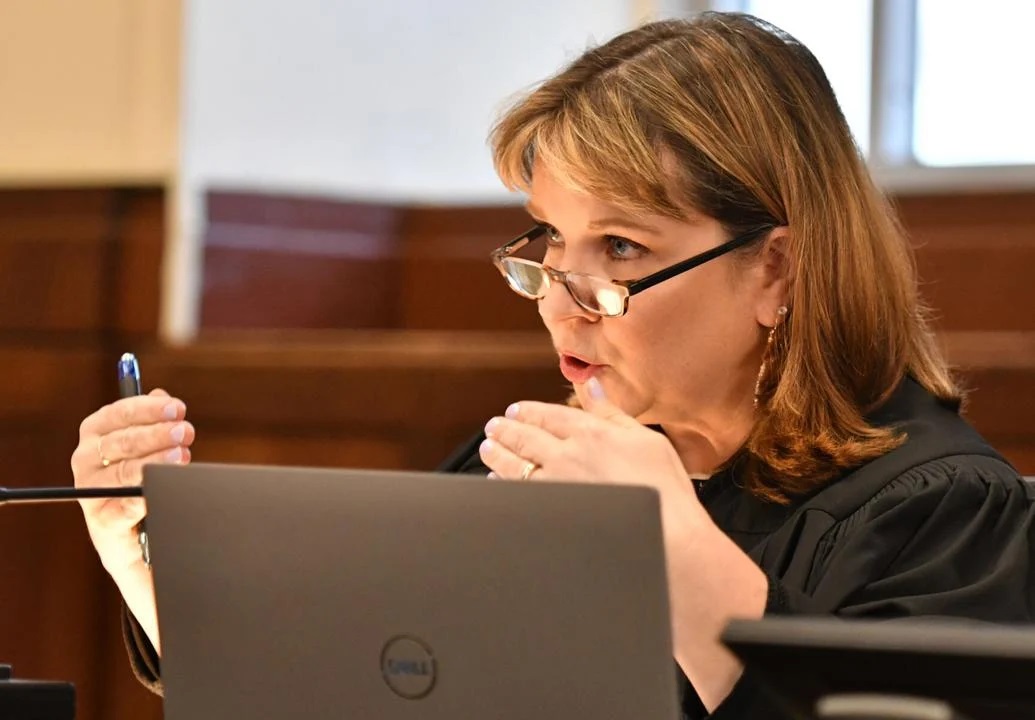latest
Judge clears way for immediate Massachusetts family shelter cap; legislature has “failed to act”

Sam Drysdale
STATE HOUSE, BOSTON, NOV. 1, 2023…..A Superior Court judge on Wednesday denied a request to put a temporary hold on the Healey administration’s plan to cap the number of families in the state’s strained emergency shelter system.
The decision followed an emergency court hearing on Tuesday, during which Lawyers for Civil Rights Boston argued that the administration was “undermining” the state’s right-to-shelter law and did not fulfill a requirement that Secretary of Housing and Livable Communities Ed Augustus give the Legislature a 90-day notice of the major policy shift.
Judge Debra Squires-Lee’s decision means that the Executive Office of Housing and Livable Communities may begin turning away families from shelter when the state reaches 7,500 families in its Emergency Shelter system, which is expected to happen this week.
“We respect the court process and believe an appropriate outcome was reached. The state does not have enough space, service providers or funding to safely expand shelter capacity,” EOHLC spokesperson Kevin Connor said Wednesday.
Andrea Park of the Massachusetts Law Reform Institute said she was disappointed in the decision, and will continue to ask the administration to rethink the plan. Park said the governor’s team should “at least hold off” until some of Healey’s new approaches, including housing vouchers that families can use while moving out of shelter, go into effect and free up room for new shelter entrants.
“We think it’ll be really dangerous, especially for children right in the coldest time of year,” Park said. “People on the ground can help them think of another solution, or at least hold off and let some of these other things go into effect that they’ve been trying to do, like facilitating more exits. Is there some more congregate space that we can figure out how to set up where people can at least be safe from the elements while they’re waiting, if they do set up a waiting list?”
The judge wrote that the plaintiffs — three families in or looking to find housing in the shelter system represented by Lawyers for Civil Rights Boston — did not have the standing to enforce the 90-day notice, and said that it is up to the Legislature.
“The notice proviso is intended to afford the Legislature the opportunity to appropriate additional funding for the program. The evidence before me, however, is clear — more than a month ago, the Governor specifically requested additional appropriations for the emergency assistance program and the Legislature has failed to act. In these circumstances, the predicate purpose of the 90-day proviso has been fulfilled; and, in all events, it is for the Legislature and not the clients of the program to enforce any claimed non-compliance,” she wrote.
Gov. Maura Healey filed a supplemental budget in September requesting $250 million to help prop up the shelter system that is strained under an influx of new families, about half of whom are new immigrants.
Massachusetts is the only state in the country that guaranteed housing for qualified families and pregnant individuals under a 1983 right-to-shelter law.
The administration’s representation said during the hearing that the appropriated $325 million for the Emergency Assistance program would not be enough to get the shelter system through the fiscal year, which began in July. They budgeted for a shelter caseload of around 4,100 families, Assistant Attorney General Kim Parr argued on behalf of Augustus, and the system was nearing capacity at 7,389 as of Tuesday and projections show the number of families could grow to 13,471 by next June.
If the current caseload of around 7,500 stayed the same through the fiscal year, Parr said, the state would still need an additional $210 million to keep the shelters running.
“If the EOHLC is unable to impose a system cap this week, and the system continues to grow at this same rate going forward, costs to fully deplete the EA line item are expected to be incurred by January 13, 2024, and HLC would not be able to make spending commitments beyond that date,” EOHLC Deputy Chief Financial Officer Sarah Barrese wrote in an affidavit.
Squires-Lee said she could not “prohibit the Executive from exercising its discretionary authority to manage this emergency assistance program within the limits of the funding that has been appropriated” and that “it would be inappropriate to order EOHLC to continue providing emergency shelter it does not have the resources appropriated by the Legislature to fund.”
LCR had been seeking a temporary restraining order to stop EOHLC, which runs the EA system, from turning people away once the shelters reached the “artificial cap” Healey set at 7,500 families.
In her decision, the judge points out that the right-to-shelter law is “subject to appropriation.”
“Throughout 2023, significant efforts have been undertaken to address the demand for emergency shelter, but the supply of shelter for families has not kept pace with demand. Nor have the funds,” she wrote, before again pointing out that the Legislature has not yet taken action on a request for more funding for the program.
Rep. Aaron Michlewitz, chairman of the House’s powerful budget committee where that $250 million request is currently sitting, said on Tuesday that there are “no easy answers” to the question of increased funding for the shelters.
“Certainly a lot to consider with everything going on in regard to the money for the migrant shelters, and everything related to that,” Michlewitz said when asked about the timeline for action ” … No easy answers in relation to that, so we’re trying to work through that right now.”
Park said MLRI would continue to ask the Legislature to continue to make more funding available.
“The reality is, they said pretty clearly, not as clearly as before but certainly yesterday, that they are running out of money,” Park said. “They don’t expect the appropriation to last. So I think at this point we just really need to focus on getting the money to make sure the system can continue to serve families.”
Spokespeople for House Speaker Ron Mariano and Senate President Karen Spilka did not return requests for comment on Wednesday regarding Squires-Lee’s decision that it is up to the Legislature alone to enforce the 90-day notice requirement.
However, Mariano did signal earlier this week that he was content to let the administration handle any changes to the 1983 law.
“Any temporary policy changes would be better addressed by the Administration through the issuance of an executive order formally declaring a state of emergency, as they have real-time information regarding capacity issues and staffing shortages, and are in constant communication with local officials during this rapidly developing situation,” the speaker said in a statement on Monday.
A component of LCR’s lawsuit was that Healey’s announcement that the state would no longer guarantee shelter for all qualified families was non-compliant with the state’s Administrative Procedures Act (APA).
Squires-Lee wrote that the governor “effectively [changed] the eligibility rules for the emergency assistance program” but that through filing emergency amendments to a regulation governing the Emergency Assistance system, EOHLC satisfied the requirements of the APA.
Those regulatory amendments were filed minutes before the emergency court hearing on Tuesday.
LCR attorneys did not immediately respond to request for comment on Tuesday.
The judge wrote that she did not need to consider irreparable harm or the public interest, as there was “no likelihood of success on the merits” of the plaintiff’s argument.
“It is clear to me, however, that all parties before the Court are operating with the evident desire to protect families and children,” Squires-Lee wrote. “EOHLC seeks to serve the greatest number of families it can with the resources available to it. No one seriously disputes that families living without safe shelter are at risk and, in particular, that children without access to stable housing may be irreparably harmed. But the burden EOHLC faces is simply that it no longer has either the money or the space to provide such housing immediately for every family that is eligible for same. In these challenging circumstances, EOHLC has acted, in its discretion, to prioritize the allocation of its resources. I give that discretion due deference.
-

 Community6 years ago
Community6 years agoNational Shrine of La Salette Festival of Lights 2017 set to begin
-

 Community6 years ago
Community6 years agoMassachusetts State Police looking for good home for retired dogs
-

 Crime6 years ago
Crime6 years agoFall River ranked most dangerous city in Massachusetts according to report
-

 latest6 years ago
latest6 years agoDurfee student allegedly overdoses on marijuana
-

 Community6 years ago
Community6 years agoVideo of Fall River Police goes viral
-

 Causes6 years ago
Causes6 years agoMissing Fall River woman found deceased
-

 Crime6 years ago
Crime6 years agoFall River Police add names to most wanted list
-

 Causes6 years ago
Causes6 years agoFall River teenager reported missing has been found





RedPilled
November 1, 2023 at 9:11 pm
A sanctuary state with a right to shelter law what could possibly go wrong?